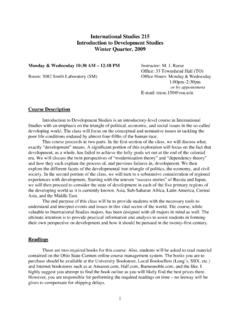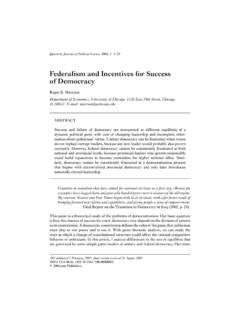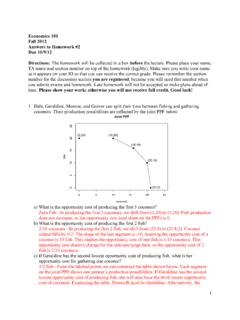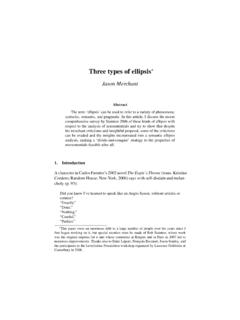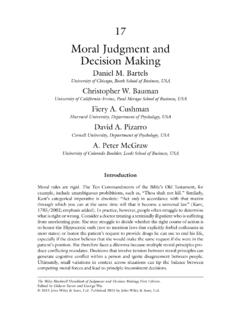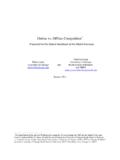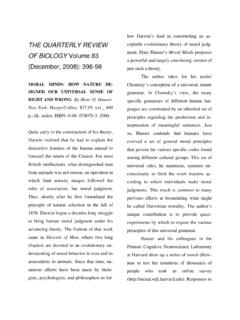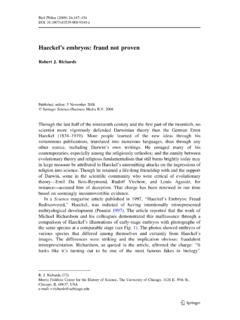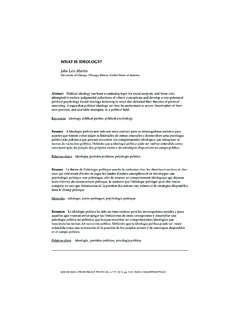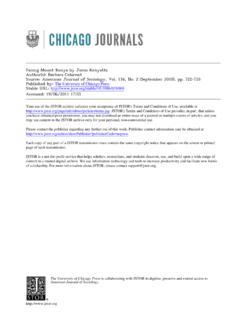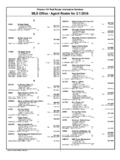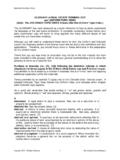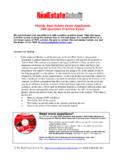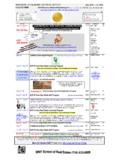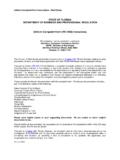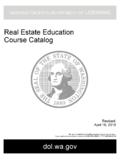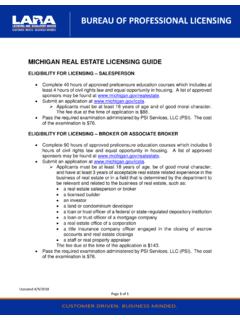Transcription of Market Distortions when Agents are Better …
1 Market Distortions when Agents are Better Informed: The Value of Information in real estate Transactions*. Steven D. Levitt University of Chicago and American Bar Foundation and Chad Syverson University of Chicago and NBER. Abstract Agents are often Better informed than the clients who hire them and may exploit this informational advantage. real - estate Agents , who know much more about the housing Market than the typical homeowner, are one example. Because real estate Agents receive only a small share of the incremental profit when a house sells for a higher value, there is an incentive for them to convince their clients to sell their houses too cheaply and too quickly. We test these predictions by comparing home sales in which real estate Agents are hired by others to sell a home to instances in which a real estate agent sells his or her own home.
2 In the former case, the agent has distorted incentives; in the latter case, the agent wants to pursue the first-best. Consistent with the theory, we find homes owned by real estate Agents sell for about percent more than other houses and stay on the Market about days longer, even after controlling for a wide range of housing characteristics. Situations in which the agent's informational advantage is larger lead to even greater Distortions . Other possible explanations, such as a lower effort on the part of agent when serving clients, lower discount rates on the part of Agents , or unobserved differences in housing quality, appear less likely to account for the observed differences.
3 *. We would like to thank Gary Becker, David Card, Vincent Crawford, Roland Fryer, Edward Glaeser, Michael Greenstone, Jens Ludwig, Chris Mayer, Tobias Moskowitz, Kevin Murphy, Derek Neal, Fran ois Ortalo-Magn , Canice Prendergast, Phil Reny, Andrei Shleifer, three anonymous referees, and the editor Daron Acemoglu for helpful discussions and advice. Elias Bruegmann and Marina Niessner provided truly outstanding research assistance. Thomas Fumo aided us in obtaining the data. Financial support provided by the National Science Foundation. Correspondence can be addressed to either of the authors at Department of Economics, University of Chicago, 1126 E. 59th Street, Chicago, IL 60637.
4 I. Introduction Because of specialization, individuals rely heavily on the advice of experts in making decisions. For activities as varied as medical treatment, automobile repair, legal matters, planning for retirement, or selling a home (to name just a few), there are experts with particular skills, knowledge, and experience willing to provide their services. A defining characteristic of transactions involving the hiring of an expert is the informational advantage enjoyed by the expert relative to the client seeking advice. As a result of this private information, expert Agents may mislead their clients by exaggerating the costs or difficulty of a solution, providing unneeded services, or otherwise distorting the information to maximize the expert's own payoff.
5 For example, a lawyer may argue that his services are necessary in preparing a simple will, even though the lawyer would use the same off-the-shelf software a client could buy. An auto mechanic may suggest overhauling the entire engine when only a small part needs replacing. A travel agent may only mention flights on airlines which pay the highest commission rates to travel Agents for booking. In this paper, we focus on the relationship between a real estate agent and a home seller. The real estate agent is likely Better informed about the value of the house and the state of the local housing Market than is the seller. (More formally, this information advantage might be thought of as the agent having a more accurate signal of the distribution of likely offers on the house.)
6 Typical residential real estate contracts have the real estate agent receiving only a small fraction of the purchase price of a home, but bearing much of the cost of selling the house (for example, showing the home to prospective buyers, hosting open houses, and often advertising and marketing expenditures). This induces a misalignment of incentives between the seller and agent. 1 The agent has strong incentives to sell a house quickly, even at a substantially lower price, and thus may encourage clients to accept sub-optimally low offers too quickly. A rational 1. An interesting question to which we turn in Section VI is why existing contractual arrangements persist in light of this distortion.
7 1. homeowner will take the agent's distorted incentives into account and, as in Crawford and Sobel (1982), discount appropriately the agent's advice regarding whether a particular offer should be accepted or rejected. Nonetheless, as we formally derived in an earlier version of this paper (Levitt and Syverson 2002), if the agent is sufficiently Better informed, the agent's optimal strategy is to advise the homeowner to accept any offer that is in the best interest of the agent to accept, and the homeowner's actions may be influenced by the agent's advice. 2 It is rational for the homeowner to sometimes follow this advice, despite being fully cognizant of the agent's desire to mislead, because home seller's and agent's incentives are well-enough aligned on net so that the seller can benefit from the agent's superior information in some instances, at the cost of the agent distorting information in a way that hurts the home seller in other instances.
8 3 Thus, the primary predictions of the theory are that (1) for two identical houses, one owned by a real estate agent and the other owned by a client of the real estate agent, the real estate agent's home will stay on the Market for a longer period of time and sell for a higher price, and (2) the greater the informational advantage of the real estate agent, the larger these two differences will be. The extent of the distortion induced by misaligned agent incentives may be considerable. real estate Agents typically bear a substantial fraction of the marketing costs involved with a home sale: advertising, accompanying potential buyers on visits to the home, conducting open 2. This older version is available at ~syverson.
9 Note that in the formal model used in the earlier version, the agent cannot credibly convey any information beyond a simple recommendation to either accept or reject the offer. Any message that attempted to further signal the intensity of the agent's preferences is cheap talk. For any offer that is high enough that the agent would like the seller to accept, the agent will have the incentive to falsely portray the offer as being extremely high, even if it is just above the acceptability cutoff. As consequence, the seller will ignore such information (Crawford and Sobel 1982). If we were to allow cash transfers from the agent to the seller, this would provide the agent a way to convey more information about the attractiveness of the offer.
10 When a really good offer arrives, the agent could credibly signal this by offering to make an additional payment to the seller if the offer is accepted. 3. Since Crawford and Sobel (1982), a rich theoretical literature has developed that analyzes strategic information transmission. Theory that is particularly relevant to our analysis includes recent work on the role of experts by Taylor (1995), Krishna and Morgan (2001), Levy (2004), and Fong (2005). For surveys of the broader literature, see Kennan and Wilson (1991) and Riley (2001). There is also a great deal of work addressing how contracts are structured to encourage Agents to exert the optimal amount of effort ( , Grossman and Hart 1983, Sappington 1991).
